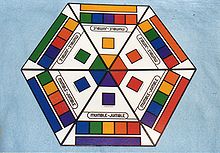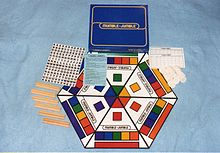- Mumble-Jumble
-
Mumble-Jumble is a word game that was copyrighted in 1986 by Albert A. Lemieux[1] currently of Lutherville, MD. This parlor game is recommended for ages 10 and older and can be played by two to six players or teams. The game is played in rounds where players score points (represented by plastic chips) by finding the word in the jumbled letters of their opponents’ word trays. The game ends when a player does the following:
- Accumulates at least 15 chips;
- Declares a Bet-for-the-Win round;
- Calls ‘stop’ in a declared Bet-for-the-Win round; and
- Correctly un-jumbles an acceptable word in each of the opponents’ trays.
Contents
Game components
- 1 Game Board – The game board is a multi-colored, six-sided board that fan-folds into a triangle. Its shape allows players to view each other’s word trays, accumulated chips and proposed plays (e.g. challenges and Bet-for-the-Win rounds ).
- 100 Poker-Style Chips – The chips are used to keep track of a player’s points. Unassigned chips are collectively referred to as “the bank”.
- 154 Letter Tiles – The tiles are ¾ inch squares of chipboard printed with a single letter. Letter frequency is based on English language words.
- 6 Wooden Letter Trays – The trays measure six inches long and are used to hold players’ jumbled words during the play of the round.
- 2 Pads of Score Sheets – Each pad contains about 100 sheets. A score sheet is used by each player for two purposes: 1) to record the player’s own word; and 2) to record the opponents’ words as they are un-jumbled during the play of the round.[2]
Sequence of play
Before beginning, players should select an “official” game dictionary to use in the event of a challenge. Each player begins with a score sheet, a writing implement, and two chips from the bank. The game proceeds in rounds. Each round begins when players select five-letter words, gather the tiles to spell this word and “jumble” the letters on their words trays. When all players are ready, one player calls “go” and players expose their trays around the board. The game proceeds as each player attempts to un-jumble his opponents’ words. Players write the un-jumbled words on their score sheets as the round progresses. The round ends when one player un-jumbles every word and calls “stop.” Then players review their words and calculate their scores. Once scores have been calculated, the round has ended[3]
Scoring
After "stop" is called in the play of a round, each player retrieves a chip from the bank for each word written on his score sheet. The player who called stop in the round receives a bonus chip. Players place these chips on the colored squares representing other players’ un-jumbled words. The player who called stop shows his score sheet. Each acceptable word recorded earns the player a chip, assuming no words have been challenged. Scoring proceeds clockwise until all players have finished scoring.
Challenging
During the scoring portion of the round, any player can challenge another player’s word on the grounds of its acceptability (see Acceptable Words). To initiate a challenge, a player places a chip in the challenge square, then announces which word he is challenging. If the challenge is successful, the challenger retains the challenge chip and the challenged player must return to the bank the chip for the challenged word. If the person who called "stop" is the one who loses a challenge, he not only loses the challenged word’s chip but all chips he would have scored during the round (including the bonus chip). A challenger who loses a challenge loses the challenge chip to the bank.
Winning the game
A player can win only after accumulating 15 chips (see Alternate Forms of Play) and attempts a Bet-for-the-Win round. Prior to the start of the play of a round, a player with 15 or more chips can place five chips from his personal chip pile into his colored triangle to declare his attempt at a Bet-for-the-Win round. In that round, if this player calls "stop" and correctly un-jumbles all the opponents’ words (with no successful challenge against him), he is declared the winner. If a player in a Bet-for-the-Win round does not win the game, the Bet-for-the-Win chips are forfeited to the bank unless: 1) the player calling stop has a successful challenge against him; or 2) the play of the round is ended by majority request. If a successful challenge is waged against a player who declared a Bet-for-the-Win round, the Bet-for-the-Win chips are forfeited to the bank.
Acceptable words
Acceptable words are those found in the official game dictionary and are ones that can be made with the letters on a player’s letter tray. For example, SCARE can be un-jumbled acceptably as RACES or CARES. All letters in the tray must be used, each only once. Unacceptable words include acronyms, prefixes, suffixes, abbreviations, contractions, hyphenated words and proper nouns.
Alternate forms of play
- Length of Word – By default the game is played with five-letter words; however, prior to the start of any game the players can agree to use any number of letters between four and eight. Players can agree to use words of various lengths for different rounds (e.g. odd numbered rounds use five-letter words, even numbered rounds use six-letter words).
- Number of players – The game is designed for between two and six players. However, to accommodate more players, teams can be used. For example 12 players can play in six teams of two. Each team plays as a single player. Single players and multiple player teams can also compete in the same game.
- Number of Words per Person – By default, each player only uses one letter tray and chooses and jumbles one word per round; however when playing with only two or three players, each player can choose and jumble multiple words per round (one word per tray).
- Bet-for-the-Win – By default, a player must accumulate 15 chips before declaring a Bet-for-the-Win round; however, players can change this number to manipulate the game’s duration. Similarly, the default number of chips a player risks in a Bet-for-the-Win round is five, but players can choose to change this as well. Risking fewer (or no) chips can shorten the game. Using more chips can lengthen the game.
- Winning the Game - Another method for declaring a winner can be the first player to reach a given number of chips or the person with the most number of chips after a specified number of rounds or at a specified time.
- Official Game Dictionary – Any Official Game Dictionary can be chosen prior to the start of the game, even those in other languages.
History
The concept for Mumble-Jumble came from the familiar newspaper feature, Jumble[4]. was conceptualized one day while its inventor worked on the Jumble in the Evening Baltimore Sun with several coworkers[5] They competed to un-jumble the words, which gave Lemieux the idea for a board game based on un-jumbling words. After a year of development and testing, the final rules were copyrighted in 1986. Lemieux assembled the game components of the first 500 games in his home. These were signed and numbered in order of assembly[6]. The games were sold in over 25 independently owned stores in the Baltimore area[7].
Notes
- ^ Copyright Office, Certificate of copyright Registration: TX 1988 345, on 10/22/1986
- ^ Towerlight (Towson University newspaper, Mary Leslie, Author, 11/20/1986, page 6 "Scrabble with a 'twist': student invents game")
- ^ The Blue & Grey (Hood College Newspaper, 11/20/1986)
- ^ Towson Flyer (Times Publishing Group, Steve Kelly, Author,"Towson man invents game" 03/18/1987)
- ^ Monday Morning, (Patuxent Publishing Company, Phyllis Kepner, Author, 01/11/1988, page 18 "Lemieux' game: playing with words")
- ^ The Baltimore Sun (Section G), Laura Charles Author 12/7/1986
- ^ Towson Times (Patuxent Publishing company, Carol Ukins , Author, "The Name Of The Game Is Entrepreneurship" 12/17/1986)
Categories:- Word board games
Wikimedia Foundation. 2010.


